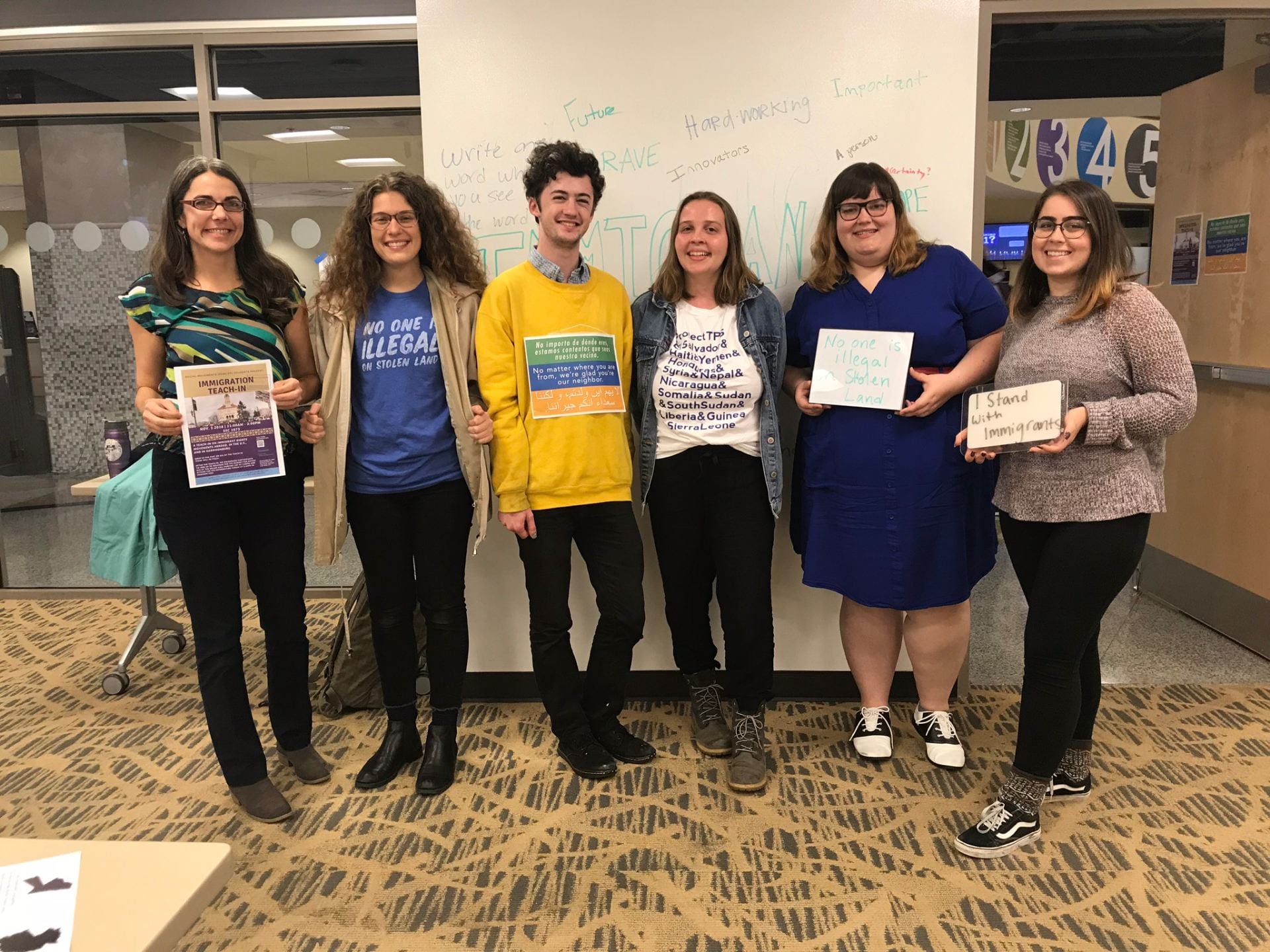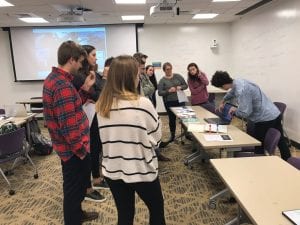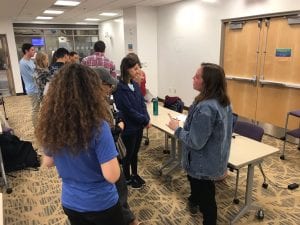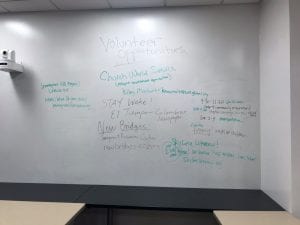Meet the Students!
(From left to right) Dr. Wylie (she/her), Nancy (she/they), Jack (he/him), Claire (she/her), Kathryn (she/her), and Liza (she/her), and created and hosted the Immigration Teach-In on Monday, November 5th 2018 as part of their community engagement project in Social Movements in the U.S. and Abroad (POSC 371). This page is a culmination of the work they produced!

Immigration and immigrants’ rights have always been a relevant topic around the world, due to the fact that migration is a human constant and human right, especially if a person is being persecuted by the nation they reside in. In an increasingly polarized society, the understanding of the cultural and legal implications of asylum-seekers, refugees, and immigrants has been forgotten and replaced with bias that dictates an understanding of the topics at hand. In order to bring awareness to various influential cases across the world, and locally, in the Harrisonburg community (which has a thriving immigrant and refugee population itself), students in James Madison University’s POSC 371 class (Social Movements in the U.S. and Abroad) held a Immigration Teach-In on November 5th, 2018, from 11am-3pm in the campus Student Success Center. The goal of the teach-in was to provide an informal location and space to raise consciousness among JMU students surrounding the national narrative on immigrants in the United States, look at case studies across the world for comparative purposes, and look at the national and local policy that affects millions of lives everyday.
| EVENT SCHEDULE | ||
| WHEN | WHAT | WHO |
| 11:00 am – 11:30 am | Introduction
Community guideline overviews with review on inclusive language terms to use (undocumented person, not all Latinx people are Mexicans, not all undocumented people are Latinx) |
Dr. Kristin Wylie and Nancy Haugh |
| 11:30 am -1:00 pm | Tabling Portion
Table presentations on refugee crises in
Local policy review and discussion of national legislation (DACA, current status of acceptance of refugee acceptance/asylum seekers) |
Team members:
Jack Hales Nancy Haugh Claire Hietanen Kathryn Walker Liza Vanyan |
| 12:45 pm -1:30 pm | CWS Presentation
|
Church World Service (CWS) AmeriCorps Rep:
Kiley Machart |
| 1:30 pm – 3:00 pm | Tabling Portion | Team members:
Jack Hales Nancy Haugh Claire Hietanen Kathryn Walker Liza Vanyan |
| 2:45 pm – 3:00 pm | Closure
Invitation to join the TPS Journey for Justice discussion in Madison Hall |
Team members |
| 3:00 pm – 5:00 pm | Temporary Protected Status (TPS) Table Talk in Madison Hall | Local TPS chapter and the TPS Journey for Justice bus riders |
Explicit goals of day – By the end of the day . . .
- Educate attendees about immigration policy and social movements in:
- Eritrea,
- Colombia,
- Germany,
- Jordan,
- The United States, and
- Harrisonburg
- Inform attendees about ways that they can get involved in the immigration rights movement in the Harrisonburg area
- Participants will understand the role that they have in influencing the immigrants’ rights movement through such acts as voting, allyship, volunteering
Implicit goals of day – By the end of the day . . .
- Engaging the JMU community and the larger Harrisonburg community over these ideas of immigration policy, movements, and framing in a positive and healthy way
- Attempt to reframe the way people think about immigrants, specifically with the writing on the wall (“undocumented” versus “illegal”, etc.)
- Attendees will recognize the similarities and differences between immigration policies and movements in the US and abroad
- Attendees will achieve a better understanding of the immigrant community in Harrisonburg
Objectives of wall writings:
- Inform attendees about the topics at each table
- Explain any pertinent acronyms/terms
- Provide general guidelines about inclusive language
- Offer a space for people to interject their own ideas
Objectives of tabling portion:
- Inform attendees about the immigration policies and movements in:
- Germany and Jordan,
- Colombia and Eritrea,
- The United States, and
- Harrisonburg
- Engage attendees in impactful and interesting conversations/activities
- These will vary between tables, and activities will be used heavily at the US/Harrisonburg tables
Objectives of speaker portion:
- Provide professional views on the current immigration policies/movements in the US as well as Harrisonburg
- Expose attendees to avenues through which they could get involved with the two organizations represented
- Showcase the barriers/circumstances of the lives of immigrants in Harrisonburg
| Timing | Process | Who? |
| 11:00-1:00 | Tabling Portion – SSC 1075
· Attendees can move freely through the room to the different tables we have set up and learn the information we’ve collected for them · Attendees can engage with our ideas on the walls, and add their own perspectives |
Group Members:
Jack Hales Nancy Haugh Liza Vanyan Claire Hietanen Kathryn Walker |
| 1:00-2:00 | Julio Reyes
· Challenges of dealing with the immigration process – serious backlogs, expenses, and paperwork; no way to become a legal permanent resident if you become undocumented on your own |
Julio Reyes – Immigration Program Coordinator at New Bridges |
| 2:00-3:00 | Kiley Machart
· Speak about the demographics of the refugee population in Harrisonburg · Give information about CWS and what they do · Talk about the process refugees go through before coming to Harrisonburg · Discuss refugee camps |
Kiley Machart – AmeriCorp Representative at Church World Service |
| 3:00 | Close-Out of Teach-In and Invitation to join us at the TPS Journey for Justice Information Meeting | Jack Hales |
The style of the Teach In as a World Cafe, as opposed to presenting on immigration in general as a lecture style, allowed us more room to engage our audience because the audience had to actively seek out the information we presented on by traveling to the tables. Additionally, being in SSC 1075 allowed us the opportunity to fully utilize the white boards present in the space. On these white boards, we were able to allow participants to write down questions they had about the presentations that we could answer at a later time, engage other participants in what they found to be the most impactful part of the presentations, reflect on what the word “immigrant” means to them, share where their family immigrated from, and see both resources as well as next step/action pieces for staying engaged with the subject after the event was over.
In terms of the topics we chose, we wanted to focus on both current events as well as issue-specific political opportunity structures that existed within our topics/countries that would lend themselves to meaningful discussion. For our country specific, comparative tables, this meant that we looked at Colombia specifically because of the relevance the Venezuelan migrant crisis lends to the topic of immigration; for Germany and Jordan, this was the Syrian refugee crisis and a desire to provide an academic discussion about immigration policy as a response; for Eritrea, this meant recognizing that the demographic of refugees in Harrisonburg includes a significant portion of Eritreans, thus making them a necessary component of local immigration policy; and for the U.S. policy table, this meant considering the migrant caravan and capitalizing off of the conversation the caravan garnered. As a result, we were able to look at these opportunity structures and realize that talking about these countries and policies specifically would be most in line with our learning objectives for the event.
During the Teach-In, we provided resources for our participants and would like to extend these resources to our website viewers. These opportunities are locally based in the Harrisonburg community and Shenandoah Valley. The local Congressional representative is Ben Cline (R) – 6th District; Senators Tim Kaine (D) and Mark Warner (D).
You can utilize the US Capitol switchboard by calling (202) 224-3121 and requesting to speak with the desired representative and Senator. If you’re uncomfortable making phone calls, you can text ResistBot at 50409 with the message “RESIST” and they will let you text a message to your representative.
Church World Service, CWS, offers plentiful volunteer opportunities for anyone looking to assist the refugee community or to facilitate their transition of movement into the Harrisonburg community. Driving families, cultural orientation class assistance, childcare, office volunteering, and donations (clothes, toys, furniture, and food) are just a few of the options offered. You can go to their website, here.
NewBridges Immigrant Resource Center (NBBIRC) is located in Downtown Harrisonburg between Beyond and Cuban Burger. The Center assists immigrants in the community with their USCIS paperwork along with other documentation, and helps ease the process of adjusting status’ (TPS, DACA, work authorization, citizenship). NBBIRC connects immigrants to social services they seek such as health and hospital bill forgiveness and community resources.
If you are looking to get involved on campus and raise volunteerism and activism on campus check out the following groups!:
- JMU Latino Student Alliance (LSA)
- JMU African Student Organization (ASO)
- JMU Women of Color (WoC)
- JMU Students for Minority Outreach (SMO)
- JMU Center for Multicultural Student Services (CMSS Madison Union 207)





